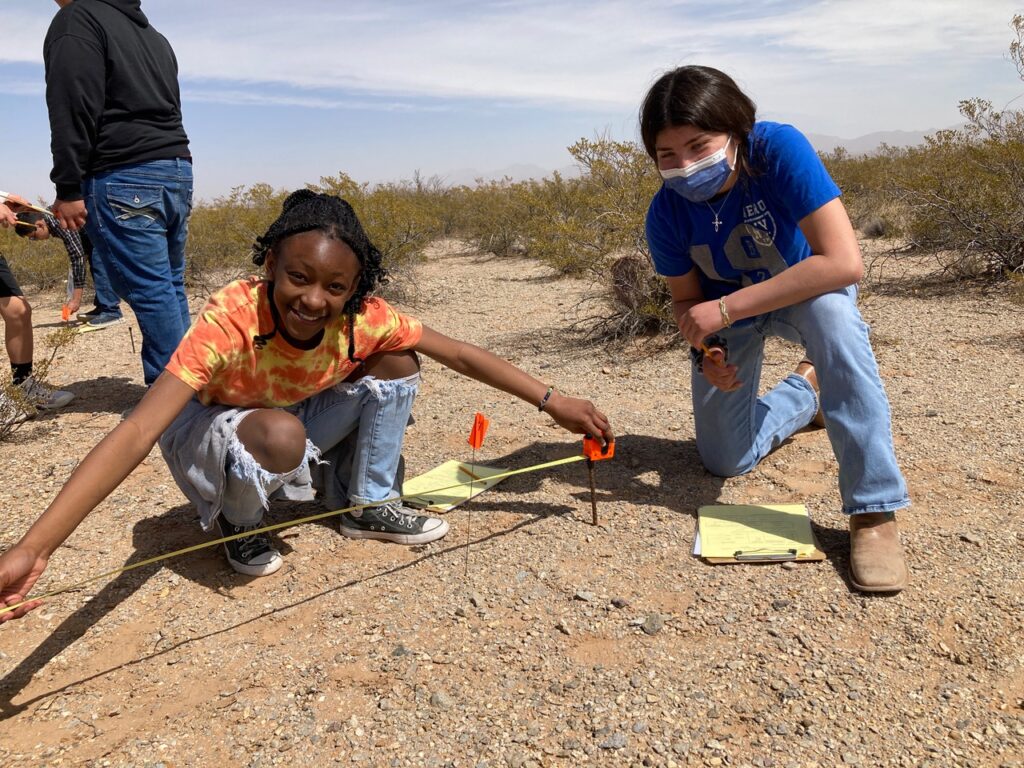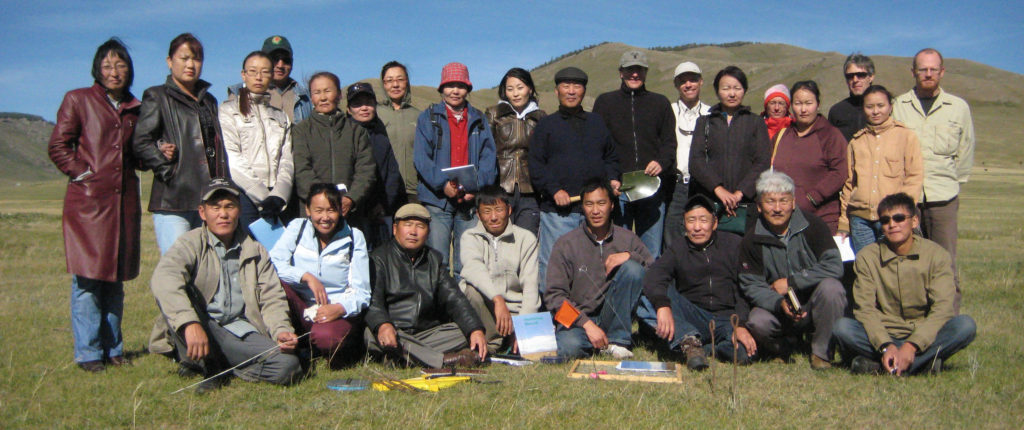We have five major parts to our outreach program that lead to broader impacts of our research.
- Educating through the transfer of science-based information to K-12 students and teachers
- Scientific outreach to public or private land managers, international collaborators, partner institutions, and the general public.
- Media communications
- Technology development and transfer
- Data and information accessibility
Highlights from these programs are listed below:
Science Education for K-12 Students, Teachers, and the General Public
Fortunately, we have an outstanding working relationship with one of the premier non-profit organizations devoted to K-12 science literacy in the nation, the Asombro Institute for Science Education. This award-winning organization works to increase science literacy for more than 20,000 students and teachers each year.
In collaboration with LTER scientists, the Asombro Institute puts their expertise into action for the Jornada Basin LTER project through several highly creative and instructional programs including:
- Field trips: Students participate in grade-specific, hands-on activity stations to collect and analyze data mirroring Jornada research.
- Classroom / schoolyard lessons: In one to three class periods, students learn about the desert and JRN research through engaging lessons that are aligned with Next Generation Science Standards.
- Desert Data Jam – Started in 2012, this unique competition challenges students to examine ecological data sets collected by JRN and other researchers, identify a data trend, and develop a creative project (e.g., song, physical model, game) that communicates the data trend to nonscientist audiences. A Mini Data Jam was developed in 2020 in response to school closures due to COVID19.
- Teacher workshops – Teachers engage with Asombro staff and JRN researchers to learn about the LTER and get access to activities and tools to bring these concepts to their own classrooms.
- Undergraduate internships in education and outreach – Paid internships allow undergraduate STEM students to work with the JRN team on education and outreach activities for K-12 students and the general public.
- Graduate student integration in K-12 education – Beginning in LTER VI, we involved JRN graduate students in 3 to 10 hours of K-12 activities, including direct assistance during K-12 student programs as well as assistance with the creation of new activities.
- LTER Children’s Book: One Day in the Desert – Published in 2017, One Day in the Desert introduces children to science at the JRN through a story of Mariana, a student from Las Cruces. A four-video series includes a guided-reading of the book along with associated activities children can do at home.
- Family-friendly public education events – JRN and Asombro collaborate to host several public education events. Guided hikes and hands-on activity booths engage the general public in JRN research, data, and discoveries.
- Interpretive signs and public art – Asombro’s nature park (located just south of most JRN research sites) features interpretive signs about JRN research and public art displays (e.g., tile mosaics, murals) used by the K-12 staff during student field trips and public education events to highlight JRN research.
All programs share two key characteristics:
- Long-term focus: The programs highlight the value of long-term ecological research. We also intentionally think about the long-term needs of our participants and assume that students will interact with our programs many times during their K-12 education.
- Local ecology and local needs: Programs focus on the ecology of the land right outside our students’ homes and classrooms. This region lacks science museums and other opportunities taken for granted in other parts of the country. We therefore meet the local needs of the K-12 community and general public by providing direct, standards-aligned programming for students in addition to workshops for teachers.

Applications
We also develop tools to collect, store, and/or analyze information related to inventory, assessment and monitoring of land resources. Two key examples of these applications are:
Both of the applications and associated products are freely available on our website and actively updated and improved. These applications, and the many newer applications in development, are widely used by our partners and clients. These applications are results from our research program.
Training materials, webinars, workshops, and field schools
Throughout the year we offer either hands-on programs on-site or instruction programs delivered over the internet to communicate our latest science based technologies. Examples of these activities include:
- our Botany Field Workshop offered bi-monthly to improve plant I.D. skills and is open registration
- workshops such as the Pedoderm and Pattern Class and
- webinars on different topics available upon request
International Partnerships (Mongolia)
As part of our collaboration with the Agricultural Research Service, Jornada LTER Research has informed land management in Mongolia. This includes a partnership with the government with Mongolia to develop measurement protocols, and an interactive map describing rangeland condition based on State-and Transition Models. To watch a youtube video about these efforts click here: Resilience-Based Management in Mongolia – An Unexpected Journey

Cooperative agreements
We work with with over two dozen collaborators, institutions, agencies, or land owner groups. In prior years our research unit maintained a focus group drawn from numerous client, partner, and stakeholder organizations that would meet annually to provide input and critical review of our research program. We have evolved this focus group into a number of separate cooperative agreements with each of these groups to more specifically address common needs and objectives. These cooperative agreements are listed at https://www.ars.usda.gov/research/projects_programs.htm?modecode=62-35-15-00.
However, we are now developing a new approach to these collaborations. We are developing portals through our website that organize many different types of information important to us and our partners in a single web-based location. These portals contain information that is transparently stored, accessed, added-to, shared, and utilized to address our common objectives and the common management problems facing our partners in a data-based, scientifically rigorous manner. This effort is new. Two portals now under development are:
- the Malpai Borderlands Group portal and
- the Las Cruces District Office of the Bureau of Land Management portal
A number of new portals, with useful applications, are under development.
Selected Presentations:
Desert ecology class and GRA program with links to Asombro – Curtis Monger, Owen McKenna
International Outreach – Brandon Bestelmeyer
Applications and outreach to land management agencies – Jeffrey Herrick
Research Synopses & Field Talks
Education and Outreach – Stephanie Bestelmeyer